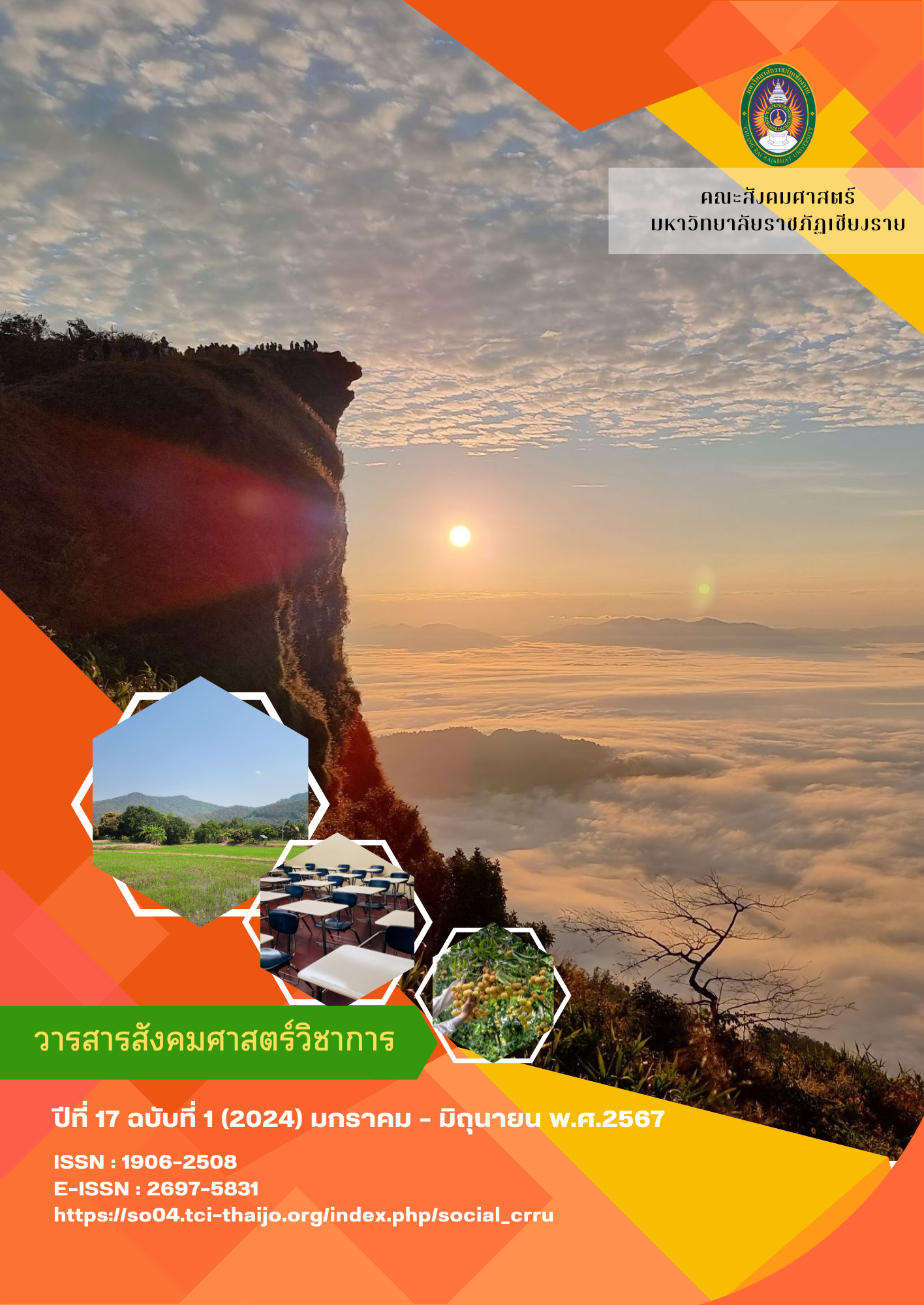Model of gastronomy tourism management to promote sustainable tourism based o
Main Article Content
Abstract
The objective of this study was to develop a tourism management model based on Chinese cultural capital in order to promote the sustainability of gastronomy tourism in Thailand. In this study, the qualitative research methodology was used. The sample of this study consisted of 30 key informants in Ban Rak Thai in Mae Hong Son Province, Ban Chak Ngaew in Chonburi Province, and Songkhla Old Town in Songkhla Province, which were selected using the theoretical sampling method. The data collection tools included in-depth interview, focus group discussion, and non-participant observation. The data was analyzed using the grounded theory study. In order to achieve the development of gastronomy tourism based on Chinese cultural capital, the factors considered in the development of the tourism management model in this study consisted of 1) conditions for gastronomy tourism based on Chinese cultural capital in 4 areas which were local communities, tourism networks, tourism services, and Chinese cultural capital-based food identity; 2) gastronomy tourism management in 5 areas which were potential analysis, strategic planning, community knowledge management, pilot tourism, and performance assessment with stakeholders. The implementation of this management model is expected to contribute to positive effects in economic, social, cultural and environmental dimensions. In addition, the results of this study can be used as a management model of gastronomy tourism based on Chinese cultural capital in a similar context.
Article Details

This work is licensed under a Creative Commons Attribution-NonCommercial-NoDerivatives 4.0 International License.
รายละเอียดของลิขสิทธ์
References
Blanco-Moreno, S., González-Fernández, A. M., & Muñoz-Gallego, P. A. (2023). Big data in tourism marketing: past research and future opportunities. Spanish Journal of Marketing-ESIC. (ahead-of-print).
Delita, F., Berutu, N., Tanjung, F., & Rambe, T. (2024). Resident's Attitudes Toward Tourism Development in Simanindo Subsdistrict Samosir Regency. KnE Social Sciences, 1165–1180-1165–1180.
Farah, L. et al. (2022). The influence of food tourism behavior on visitor intent to purchase local food: A study in Serang, Banten, Indonesia. Current issue in tourism, gastronomy, and tourist destination research, 1, 1-8.
Global Sustainable Tourism Council. (2022). What is sustainable tourism?. Retrieved from https://www.gstcouncil.org/what-is-sustainable-tourism/
Guruge, M. (2020). Conceptual Review on Gastronomy Tourism. International Journal of Scientific and Research Publications (IJSRP), 10(2), 319-325.
Igor, M. (2024). European capital of culture and sustainable tourism: challenges, trends and perspectives. An international interdisciplinary journal, 72(1), 20-34.
Ilenia, S. et al. (2023). Stakeholder participation in planning of sustainable and competitive tourism destination: the Genoa integrated action plan. Sustainability journal, 15(6), 1-32.
Iwona, N. (2021). Sustainable Tourism Development. Regional Formation and Development Studies, 3(8), 157-166.
Jajang, G. & Annisa, P. (2018). How local community could contribute to the tourism development in rural area?. KnE social sciences, 3(11), 826-834.
Jennifer, K. L. C., Karmarul, M. M. & Tini, M. M. (2021). Local community participation and responsible tourism practices in ecotourism destinations: A case of Lower Kinabatangan, Sabah. Sustainability journal, 13(23), 1-30.
Justice, M. (2019). Sustainable development: Meaning, history, principles, pillars, and implications for human action: Literature review. Cogent social sciences, 5(1), 1-21.
Kiran, K. (2020). Sustainable developments in management. Journal of Management and Science, 12(20), 73-76.
Khoshkam, M., Marzuki, A., Nunkoo, R., Pirmohammadzadeh, A., & Kiumarsi, S. (2023). The impact of food culture on patronage intention of visitors: the mediating role of satisfaction. British Food Journal, 125(2), 469-499.
Kritsana, N. & Kampanart, W. (2021). Community-Based Cultural Tourism Management. Journal of Roi Kaensarn Academi, 6(11), 350-363. (In Thai)
Meng, J. (2023). Chinese cultural symbols and the spread of Chinese culture. Education and teaching research, 2, 22-28.
Moraes, A., Farinaci, J., Prado, D., Araujo, L., Dias, A. C., Ummus, R., & Seixas, C. (2023). What comes after crises? Key elements and insights into feedback amplifying community self-organization. Ecology and Society, 28(1).
Nika, R. V. & Blaz, K. (2021). Gastronomy tourism: A brief introduction. Acta geographica slovenica, 61(1), 95-105.
Nuanphun, W. & Narin, S. (2023). Guidelines for the development of gastronomy tourism based on Chinese cultural capital of the area of Charoen Chai alley, Yaowarat. Journal of sustainable tourism development, 5(1), 55-70. (In Thai)
Office of Permanent Secretary. (2021). Summary Report of the National Accounting of Tourism for Fiscal Year 2020 Development and Preparation of National Accounting in Tourism. Bangkok: Tourism and Sports Economy Division, Office of the Permanent Secretary, Ministry of Tourism and Sports. (In Thai)
Pavlidis, G., & Markantonatou, S. (2020). Gastronomic tourism in Greece and beyond: A thorough review. International Journal of Gastronomy and Food Science, 21(20) , 2-10.
Park, E., Muangasame, K., & Kim, S. (2023). ‘We and our stories’: constructing food experiences in a UNESCO gastronomy city. Tourism Geographies, 25(2-3), 572-593.
Prince, S. (2022). World Tourism Organization (UNWTO). In Encyclopedia of Tourism Management and Marketing. Edward Elgar Publishing.
Rowland, L. & Apoorva, H.(2024). Impacts of cultural events and festivals on cultural tourism. Journal of advance zoology, 45(4), 174-179.
Sopha, C., Suanpang, P., Boonchua, T., Siripanwattana, C., Saengrungrueang, T., Buntham, P., Chysirichote, T., & Seedaluang, B. (2022). The Development of Gastronomy Tourism Manpower to Support the Gastronomy Tourism Village in Secondary Cities of Active Beach. Sripatum Review of Humanities and Social Sciences, 22(2), 129-142.
Sthapit, E., Piramanayayagam, S., & Björk, P. (2020). Tourists' motivations, emotions, and memorable local food experiences. Journal of Gastronomy and Tourism, 5(1), 17-32.
Strzelecka, M. (2015). The prospects for empowerment through local governance for tourism-the LEADER approach. Journal of Rural and Community Development, 10(3), 78-97.
Shukla, P. S., & Shamurailatpam, S. D. (2024). Effects and Implications of Event Tourism on Sustainable Community Development: A Review. Event Tourism and Sustainable Community Development, 31-49.
Supradith, S., & Pooripakdee, S. (2023). The First Step Of Social Enterprise Operation Of Sustainable Community-Based Tourism. Latin American Journal of Pharmacy, 42(3), 264-274.
Urapree, P. et al. (2018). Cultural tourism behaviors: Enhancing the influence of tourists’ perceptions on local Thai food and culture. The open psychology journal, 11(1), 184-197.
Yanagi, M. (2022). Analysis of the path and mode of tourism resources innovation in Japan. Geographical Research Bulletin, 1, 2-13.


